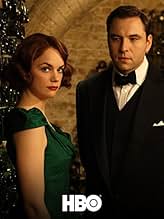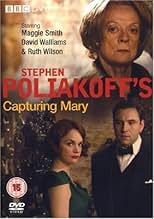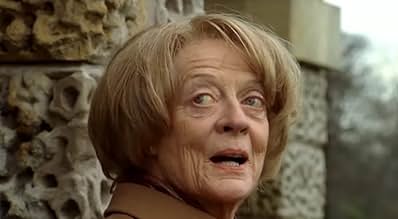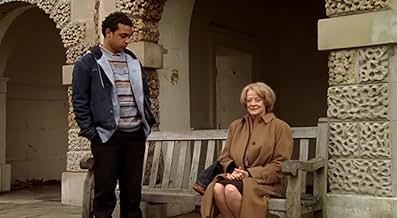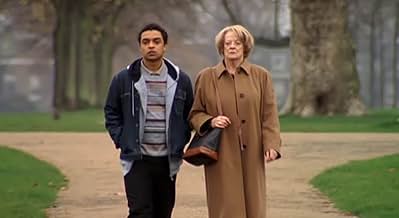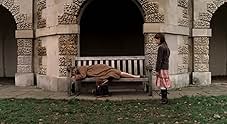IMDb RATING
6.7/10
2.2K
YOUR RATING
A young man ushers an older woman into a dark exploration of her past - back to the time when, as a young girl, she met a stranger who affected her life forever.A young man ushers an older woman into a dark exploration of her past - back to the time when, as a young girl, she met a stranger who affected her life forever.A young man ushers an older woman into a dark exploration of her past - back to the time when, as a young girl, she met a stranger who affected her life forever.
- Nominated for 1 Primetime Emmy
- 1 win & 6 nominations total
Freya Berry
- Beautiful Girl
- (uncredited)
Jessica Blake
- Party guest
- (uncredited)
Lily Brown Griffiths
- Party guest
- (uncredited)
Kate Burdette
- Charlotte
- (uncredited)
Lexie Lambert
- Parlour Maid
- (uncredited)
Silvia Lombardo
- 1960s Party Guest
- (uncredited)
Luke Lynch
- Man Leaving Pub
- (uncredited)
- Director
- Writer
- All cast & crew
- Production, box office & more at IMDbPro
Featured reviews
The performances by Maggie Smith and David Walliams was excellent, as expected. The filming was beautiful as well. However, I have absolutely no idea what this movie was about. There was no point that was made.
I feel like I wasted 100 minutes of my life. What a fail!
I feel like I wasted 100 minutes of my life. What a fail!
Maggie Smith was the drawcard for watching this oddity that sounded like it may have had something to say. Writer/director Stephen Poliakoff keeps the viewer waiting to see if his story will develop into a profound revelation or simply avoid the issues being seriously suggested. This treatment is nothing more than a filmed stage play & these usually leave the patient viewer wondering why they bothered to stay through to the end - 'Mary', proves to be just another . In the 60's and 70's a movie like this might have been produced by the B.F.I. as a 30-40min short story and would have been interesting all the way but, being stretched for over 100mins kills sustained interest & is quite infuriating. Poliakoff's grandfather had associations with the company that supplied hearing aids to famous people i.e. Winston Churchill - so it's possible some stories of a 'personal' nature may have been overheard or known.
There are stories involving political and royal dignitary's, movie makers, and socialites, ugly enough to nauseate and make the skin crawl - this story dramatically hints of many such people being implemented in such evil occurrences, but then rattles on, going nowhere. It appears 'Mary' is the second part of an earlier movie titled 'Joe's Palace' - If this overlong HBO/BBC spin-off is any indication - then might just be best to stay away from both. Disappointing.
There are stories involving political and royal dignitary's, movie makers, and socialites, ugly enough to nauseate and make the skin crawl - this story dramatically hints of many such people being implemented in such evil occurrences, but then rattles on, going nowhere. It appears 'Mary' is the second part of an earlier movie titled 'Joe's Palace' - If this overlong HBO/BBC spin-off is any indication - then might just be best to stay away from both. Disappointing.
Hard not to argue with all the 1 and 2 star ratings. This is not a Hollywood-type movie. My take is a little different from those who believe the film is about power over others or miss spent youth. In trying to understand why this movie was made, and why many seem to think that there is not plot - I suggest the following.
Greville never existed. He symbolically, was Mary's past, which she never fully escaped from.
Greville was the representation of those times. He understood the horrors of the class system and power, but insisted that elitism is the better choice over the unwashed masses. That much is clear, that is, his attitude. Why did Greville need Mary's help? Because Greville was dying, that is, his power waning, his generation losing influence. That is, he is clearly depicted as representing his times in his unchanging attitude and even his 'symbolic' refusal to dress to the times. He knew many secret things, but no one really knew who or what he did, again symbolic, not really a man, but an incarnation of the theme - the passing of a generation.
But how could have Mary helped this 'symbol'? She was a writer, and could have written/influenced the course of social change. She lost her job, as it was stated, because her 'voice of youth' had already become passe. Mary, again as stated, was born between what was coming of age and what was dying socially. Somewhere along the way she lost her voice, her inspiration. Greville, wanted her to be his partner, he could help her professionally, meaning that by writing favorably of the past, of those mores, beliefs, and class system, those still in power (albeit waning) could support her.
Greville, the symbol, didn't directly have Mary fired. It was a plot device. Mary, as was stated, simply lost favor as the times moved on. Mary was torn between the past and her uncertain future. She dressed the part, again as stated, but she really didn't belong to the changes coming.
I believe, if you see Greville as a plot device, a symbol of Mary being lost between generations, then we see the sad story of a women who was lost. She was at her best when she was young, criticizing the mores of class and status. But then that grew tiresome, and meaningless, being on the leading edge, that type of criticism was soon to be common place.
The Greville, inside of her, wanted her to support what was refined in society, even if the gild often covered over ugliness just beneath the surface. Greville haunted her, when she wrote, she always ended up in the wine cellar, a symbol of the elite.
Why couldn't she surrender to Greville, that is, the voice in her representing, belonging to the past? That is a hard question to answer, and I would think could only be answered subjectively. I can venture to say that she recognized the ugliness of the past, but also could not accept how social change was pushing society towards also becoming ugly, common. Consequently, she was lost between two worlds. One the one hand a world her youth rejected, and the other which she becomes common herself, and wrote about antiques.
Greville never existed. He symbolically, was Mary's past, which she never fully escaped from.
Greville was the representation of those times. He understood the horrors of the class system and power, but insisted that elitism is the better choice over the unwashed masses. That much is clear, that is, his attitude. Why did Greville need Mary's help? Because Greville was dying, that is, his power waning, his generation losing influence. That is, he is clearly depicted as representing his times in his unchanging attitude and even his 'symbolic' refusal to dress to the times. He knew many secret things, but no one really knew who or what he did, again symbolic, not really a man, but an incarnation of the theme - the passing of a generation.
But how could have Mary helped this 'symbol'? She was a writer, and could have written/influenced the course of social change. She lost her job, as it was stated, because her 'voice of youth' had already become passe. Mary, again as stated, was born between what was coming of age and what was dying socially. Somewhere along the way she lost her voice, her inspiration. Greville, wanted her to be his partner, he could help her professionally, meaning that by writing favorably of the past, of those mores, beliefs, and class system, those still in power (albeit waning) could support her.
Greville, the symbol, didn't directly have Mary fired. It was a plot device. Mary, as was stated, simply lost favor as the times moved on. Mary was torn between the past and her uncertain future. She dressed the part, again as stated, but she really didn't belong to the changes coming.
I believe, if you see Greville as a plot device, a symbol of Mary being lost between generations, then we see the sad story of a women who was lost. She was at her best when she was young, criticizing the mores of class and status. But then that grew tiresome, and meaningless, being on the leading edge, that type of criticism was soon to be common place.
The Greville, inside of her, wanted her to support what was refined in society, even if the gild often covered over ugliness just beneath the surface. Greville haunted her, when she wrote, she always ended up in the wine cellar, a symbol of the elite.
Why couldn't she surrender to Greville, that is, the voice in her representing, belonging to the past? That is a hard question to answer, and I would think could only be answered subjectively. I can venture to say that she recognized the ugliness of the past, but also could not accept how social change was pushing society towards also becoming ugly, common. Consequently, she was lost between two worlds. One the one hand a world her youth rejected, and the other which she becomes common herself, and wrote about antiques.
I'm surprised to find myself headlining a Poliakoff film as "boring" but I can't find any other way of describing this drag of a sagging saga.
Maggie Smith can do no wrong of course, and it would be sacrilege to criticise - she is truly a very skilled actor and is the reason I gave the film 5 stars . . .
However, David Walliams felt like he was all his Little Britain characters in one. In LB he's in his element, but outside that zone of easy comfort, he is, well, merely Walliams being given something other than comedy to try out, and I'm afraid he didn't cut it for me.
Everything seemed to go only so far. The posh accent, the gesticulations, thr facial expressions - all conspired to leave me unconvinced. And it always felt like Matt Lucas was about to suddenly appear from the scullery.
There are others here better qualified than I who can tell you what they think the "plot" was all about. To my mind it was just a slow windy spiral staircase through the mind of a now older woman trying to exorcise some past demons.
I can't review anymore because I fell asleep. I'm sure those kept awake by wondering how it all ends will stay the course, but frankly, there wasn't much in this film to make me care about the ending.
Maggie Smith can do no wrong of course, and it would be sacrilege to criticise - she is truly a very skilled actor and is the reason I gave the film 5 stars . . .
However, David Walliams felt like he was all his Little Britain characters in one. In LB he's in his element, but outside that zone of easy comfort, he is, well, merely Walliams being given something other than comedy to try out, and I'm afraid he didn't cut it for me.
Everything seemed to go only so far. The posh accent, the gesticulations, thr facial expressions - all conspired to leave me unconvinced. And it always felt like Matt Lucas was about to suddenly appear from the scullery.
There are others here better qualified than I who can tell you what they think the "plot" was all about. To my mind it was just a slow windy spiral staircase through the mind of a now older woman trying to exorcise some past demons.
I can't review anymore because I fell asleep. I'm sure those kept awake by wondering how it all ends will stay the course, but frankly, there wasn't much in this film to make me care about the ending.
To begin with, I found the acting in this film superb. Maggie Smith was flawless as ever, and, as I am accustomed only to David Walliams'comedic work it was a treat to see him in something completely different.
While watching it my expectations were turned on end continually. At first it was shaping up as "aged socialite revisits colourful past", then it veered towards romance, swiftly doing a 180 towards suspense/horror. I could never seem to be able to slot it neatly into one genre, and after some time of feeling frustrated and somewhat confused, I relaxed and decided to just watch. By the end I felt I had been on a journey, one without a predictable structure or clear moral outcome, but one that slowly revealed character's life-questions. And there was satisfaction in knowing those questions were only beginning to be answered by the roll of the ending credits.
While watching it my expectations were turned on end continually. At first it was shaping up as "aged socialite revisits colourful past", then it veered towards romance, swiftly doing a 180 towards suspense/horror. I could never seem to be able to slot it neatly into one genre, and after some time of feeling frustrated and somewhat confused, I relaxed and decided to just watch. By the end I felt I had been on a journey, one without a predictable structure or clear moral outcome, but one that slowly revealed character's life-questions. And there was satisfaction in knowing those questions were only beginning to be answered by the roll of the ending credits.
Did you know
- TriviaCompanion piece to Joe's Palace (2007), which is the first movie.
- ConnectionsFeatured in The 62nd Primetime Emmy Awards (2010)
Details
- Release date
- Countries of origin
- Language
- Also known as
- Поимка Мэри
- Filming locations
- 38 Hill Street, Mayfair, London, England, UK(Mayfair mansion exteriors)
- Production companies
- See more company credits at IMDbPro
Contribute to this page
Suggest an edit or add missing content


